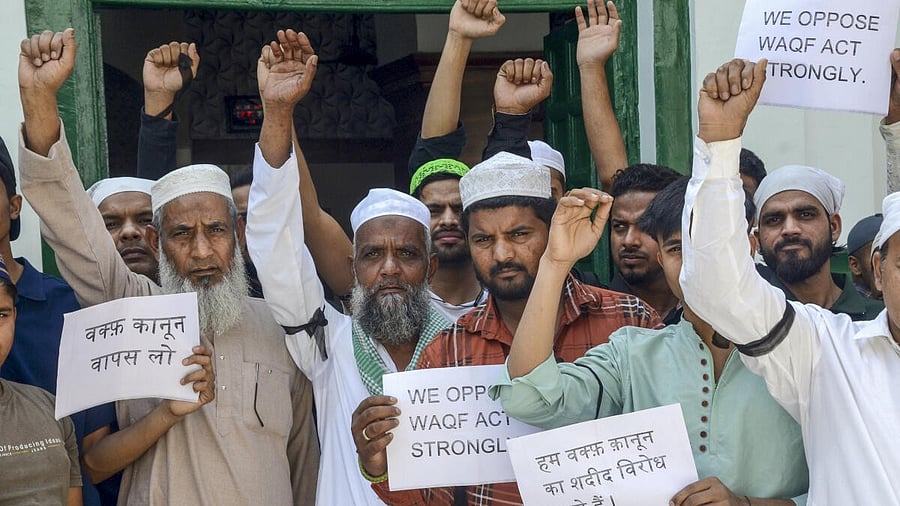
People from the Muslim community stage a protest against the Waqf (Amendment) Act.
Credit: PTI File Photo
New Delhi: A fresh plea has been filed challenging the constitutional validity of the provisions of the Waqf Act, 1995 as amended by Waqf (Amendment) Act 2025, which allegedly allowed Muslims to capture illegally the property of public utility, the government and Gram Samaj lands and those of religious places of Hindus.
The plea filed jointly by advocate Hari Shankar Jain and Mani Munjal claimed those provisions violated Articles 14, 15, 21, 25, 26, 27 and 300A of the Constitution.
"Muslims...have created a big empire and are earning crores of Rupees at the cost of general public and every member of the public is severely affected by the provisions which are not only discriminatory but extend undue favors to the Muslim Community creating disbalance and disharmony in the Indian society and putting the life, property and religious rights of Hindus at peril," it contended.
The petitioners claimed the public at large in whole of the country is aggrieved from the illegal acts of taking deceitful or forcible possession of the property of individuals and the public properties, have filed more than 120 petitions in different High Courts and the same are pending for adjudication.
They pointed out the Union Minister for Home Affairs, Amit Shah has made statement in Parliament during debate on Waqf Amendment Act giving factual position about the rapid increase of waqf properties in India.
He disclosed that 'from 1913 to 2013, the total land under the Waqf Board was 18 lakh acres. However, between 2013 and 2025, this land increased by 21 lakh acres, bringing the total to 39 lakh acres, with 21 lakh acres being added after 2013. He further revealed that while 20,000 properties were originally recorded as leased, official records in 2025 now showed zero leased properties, indicating that these properties were sold off.'
They contended that the Parliament Waqf Act, 1995 was drastically amended in 2013 by which Gram Panchayat land were included in the definition of Waqf.
"The inclusion of Gram Panchayat Land in the waqf by Parliament is clearly discriminatory and hit by Articles 14 and 15 of the Constitution of India. Parliament transgressed its powers in including Gram Panchayat land as Waqf properties. The Hindus have equal right over such land. The Land of Gram Samaj is public land and the same cannot be property of one community or sect and therefore, the provision is ultra vires to Article 14 and 15 of the Constitution of India," their plea said.
The plea emphasised that the Waqf Act has been enacted to decide the dispute between Muslims and other communities cannot be party to such litigation.
In exercise of powers under Section 4/5 the properties of non-Muslims cannot be declared as waqf property. In case, the property of a Hindu/non-Muslims had been declared or registered as waqf property, the aggrieved person is entitled to file a suit in Civil Court and he cannot be compelled to approach Waqf Tribunal for the redressal of his grievance, their plea said.
But by introducing the words 'person aggrieved' even a non-Muslim is required to approach Waqf Tribunal which is completely in violation of Articles 14 and 15 of the Constitution. The right to property protected under Article 300-A of the Constitution therefore, non-Muslims cannot be deprived to file suit asserting their right as is available under civil law in case of deprivation of right to property, the plea stated.
In fact, a person/organisation/religious sect /religious denomination/institution are forced to approach a Tribunal formed on the basis of religion for enforcing their right, the plea said.
"That even though Parliament has amended the most draconian provisions contained in Section 36 of the Act, but such provision is still not in conformity with the principles underlying Articles 14 and 25 of the Constitution," it said.
The Waqf Act from time to time unguided, unfettered, unchecked and unbalanced powers have been conferred on Waqf Board in contravention of Article 14 of the Constitution of India and such powers are being exercised to usurp the properties of the Government and the private properties of non-Muslims, the plea said.
The petitioners, among other prayers, sought a declaration that Hindus/non-Muslims cannot be affected by any action, decision or order passed/taken in the proceeding under Section 4 and 5 of Waqf Act.
They also asked the court to declare that members of Hindu Community/Non-Islamic Communities can approach Civil Court against any action taken under the Waqf Act and the provisions of Section 83/85 of the Waqf Act are not applicable to them.
